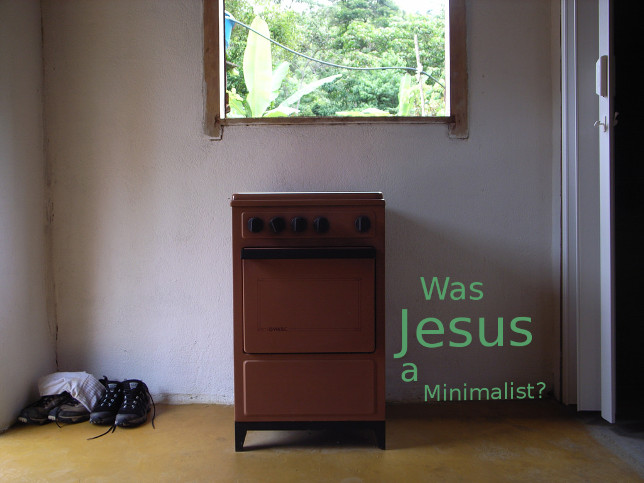By Al Acevedo
I first learned about minimalism about a year ago when my wife became interested in building a "capsule wardrobe." It's been a pleasant journey watching things from our place slowly disappear. For those of you not familiar with this counter-culture lifestyle, let me explain what it is. Minimalism is not selling all you have, giving it to the poor, and avoiding the pleasures/comforts of this life. Nor is it a contest to see who has the least amount of items in their tiny house or little apartment (If they even own one). Minimalism, in its purest definition, is letting go of the excess in order to focus on what's important to us.1
It's a lifestyle. Much like the fitness/physique development enthusiast who visits the gym five days a week, makes sure they eat enough protein, and snaps selfies of their progress to post on Instagram. Minimalism is a way of life. But was it Jesus' way of life?
One thing we know about Jesus is that He was not a Maximalist (I'm not sure if this is even a word, but let's roll with it). A casual reading of the New Testament will make this clear. Jesus was not a hoarder. He had a very good relationship with "things," and taught how we could too. On one occasion Jesus told His followers:
"Don't collect for yourselves treasures on earth, where moth and rust destroy and where thieves break in and steal. But collect for yourselves treasures in heaven, where neither moth nor rust destroys, and where thieves don't break in and steal" (Matt 6:19-20, HCSB).
Jesus' point here is that believers should invest in what pleases God. (See also Matt. 6:33). When we read these verses, it helps to keep in mind that Jesus was speaking to His disciples, who are already believers on their way to heaven (Matt 5:1). Entrance into heaven is a free gift given to anyone who believes in Jesus (John 3:16; Eph 2:8-9). Here Jesus promotes storing treasures in heaven, but he also discourages storing treasures on earth (such as a massive house stuffed with items we don't even use). Jesus says that collecting things is a pointless pursuit. So it's pretty clear that Jesus was not a collector, but is this enough to label Jesus as a minimalist?
One question minimalists ask to determine whether they want to keep a possession or get rid of it is: "Does this [item] add value to my life?" Could it be that Jesus only kept material things that added value to His life? In other words, did Jesus only possess things He needed? Did He get rid of the excess? We don't know how many items Jesus possessed. The authors of the Bible do not directly share this with us. We have to look for clues.
Let's start with the living arrangement question. Did Jesus own a house? There is some debate about whether or not Jesus owned a house. Some argue that the house they were in in Mark 2:15 was Jesus' house, and not Levi's. But the context of Mark 2:13-17 parallels Luke 5:27-32, making it clear that Levi owned the house they were in. Even if Jesus did own a house, He could still qualify as a minimalist. (A mansion is a different story.) So what about His other belongings?
One verse that gives us a clue as to how many possessions Jesus had during His ministry is Luke 9:58 (See also Matt 8:20). "Foxes have dens, and birds of the sky have nests, but the Son of Man has no place to lay His head" (HCSB). With all the traveling Jesus did, He would have had a hard time hauling around a bunch of stuff, and I don't think He rented a storage unit. It would have only made sense to travel light. This reminds me of minimalists who purposely own fewer items so that they can travel freely.2 It looks like Jesus fits this type of thinking.
Probably the greatest indicator that Jesus had a minimalist mind-set is His focus on what was important to Him: to do the will of the Father (John 4:34). As I mentioned earlier, the whole reason for eliminating clutter is to focus on what's important to us. Jesus' focus was to do the will of God the Father by dying on the cross to pay the price for the sins of the world and then rise from the dead. To accomplish His mission, He would have had to eliminate anything standing in His way-including unnecessary material possessions. In other words, Jesus most likely got rid of the junk that did not add value to His mission. If this is true, then Jesus can be called a minimalist.
So should I become a minimalist like Jesus? Yes! Reduce everything you own to a hundred possessions or less in Jesus name. Not really. Minimalism comes in different flavors depending on the individual. Jesus' minimalism lifestyle is unique, and ours should be too. We do not want to turn something that will provide freedom into something that will put us in bondage. There is nothing wrong with owning things. I think the best approach to take with possessions is to ask, "Will this add value to my life?" If it doesn't, then get rid of it or don't buy it.
1 http://www.theminimalists.com/minimalism/2 http://exilelifestyle.com/about/
